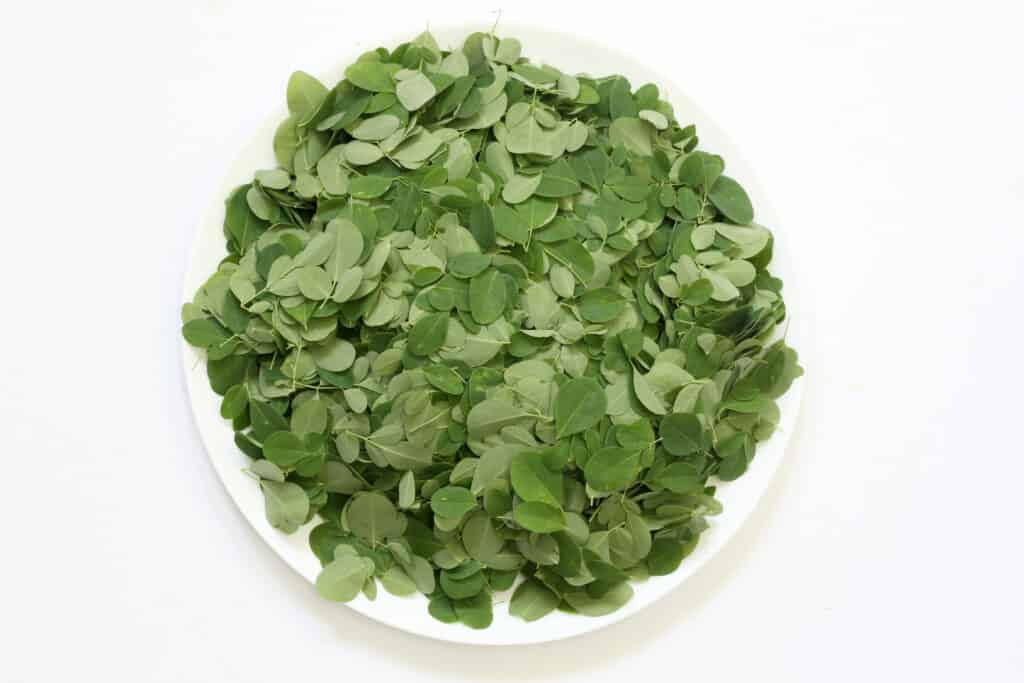A common question that we get here at Morning Gardens is if Moringa helps lower uric acid levels. The short answer is yes, the Moringa leaf contains various active compounds that lower blood uric acid levels. This is great for people looking to reduce their Uric Acid levels.
Several problems arise from inflammation and oxidative processes brought on by chronic hyperuricemia. The existing chemical medicines, however, have dangerous adverse effects. Moringa oleifera leaf ethanol extract contains a variety of active compounds that have the potential to lower blood uric acid and inflammatory cytokine levels.
For example, organic Moringa powder is one of the most popular natural components in traditional Indonesian medicine. The seeds and leaves of the young Moringa tree are used as vegetables, and Moringa powder, however, is sometimes even made from the dried seeds themselves. The plant’s roots and leaves are commonly used as a non-pharmaceutical method of alleviating joint discomfort and is frequently used as treatment for rheumatism and gout.
A full Moringa Guide Can Be Found Here, with much more research.

What are Uric Acid Levels?
Humans produce uric acid as a byproduct of purine metabolism; this waste product, which has no physiological purpose, can lead to inflammation if it builds up to unsafe levels.
Hyperuricemia refers to an abnormally high concentration of uric in the blood, which can occur under certain pathophysiological circumstances. Hyperuricemia can result from increased uric acid synthesis or decreased kidney excretion.
Gout, often known as “gouty arthritis or urarthritis,” caused by uric crystal deposition, is a painful condition associated with hyperuricemia.
The Moringa plant may have the ability to alleviate the symptoms of rheumatism and urarthritis. Alkaloids and flavonoids are among the active compounds that help provide such benefits. Both of these chemicals can reduce pain and inflammation, which makes them excellent candidates for treating the pain of rheumatoid arthritis.
Reference:
Fajar Wahyu Pribadi and Catharina Widiartini 2019 IOP Conf. Ser.: Earth Environ. Sci. 406 012006 https://iopscience.iop.org/article/10.1088/1755-1315/406/1/012006/pdf
Does Moringa oleifera lam Cause High Uric Acid?
Thanks to the active compounds in the moringa plant, Moringa helps lower uric levels rather than increase them. These chemicals, which include alkaloids and flavonoids, act as an anti-inflammatory and a pain reliever and prevent the formation of uric acid.
Moringa oleifera also contains alkaloids that protect the body against the formation of this acid. These alkaloids are effective because they block the inflammatory response before it even begins by reducing the phagocytic activity of white blood cells.
Does Moringa Leaf Cause Gout?
Moringa does not cause Gout (urarthritis). Moringa leaves contain high amounts of flavonoids and alkaloids that can stop the body from producing uric acid.
Therefore, Moringa is an excellent natural remedy for treating gouty arthritis and other uric acid-related conditions.

Moringa also contains strong anti-inflammatory properties and high contents of phenolics that help with gout treatment.
These ingredients lower the risk of getting the disease, help treat Gout, and tackle whatever may cause inflammation.
What’s the effect of Moringa on gout treatment?
Moringa has anti-inflammatory properties that help combat the metabolic disorders associated with hyperuricemia. And we’ve found that Moringa can also help lower uric acid levels and reduce inflammation. In doing so, it helps deal with the cause of Gout.
Urarthritis is a type of arthritis that causes swelling and pain in the joints, and this happens when there is a build-up of too many deposits of uric acid in the joints.
Another effect of Moringa is that its powdered form can impact inflammatory markers and accelerate tissue repair, thereby tackling acute gout attacks.
Even though gout medicines can cause liver damage and make the liver fatter, Moringa powder helps to prevent both.
Gout, Diet & Uric Acid
A gout attack is an unpleasant form of arthritis caused by the accumulation of uric acid crystals in and around a joint due to elevated blood levels of uric acid.
Uric acid is formed when the body breaks down purine. The body produces purine, and it is also obtained from certain meals. Uric is removed from the body through urine.

A gouty arthritis diet can also lower the amount of uric acid in the blood. A change in diet won’t help get rid of Gout. However, it can lessen the likelihood of future urarthritis attacks and reduce the damage already done to the joints.
Read on to find out how you can naturally lower the amount of uric acid in your body.
Drink More Water
If you drink a lot of water, your kidneys can get rid of uric faster. Always have a water bottle on hand, and remember to drink some water frequently.
Avoid Sugary Foods
High uric acid levels are usually caused by eating a lot of protein, but sugar also plays a significant role.
Natural sources of fructose include fruit and honey. When your body digests fructose, it gives off purines and produces more uric acid.
You can reduce your sugar intake by following these steps:
- Incorporate more whole foods into your diet.
- Eat fresh fruit when you want something sweet.
- Cut down on processed and packaged foods.
Cherries
The red pigment in cherries, called anthocyanins, is an antioxidant and anti-inflammatory substance.
In addition to being delicious, they are rich in fiber and vitamin C. Eating a bowl of cherries or drinking some tart cherry juice without adding sugar.
Stay Away From Alcohol
Alcohol can cause dehydration, and our research also shows that it can cause uric acid levels to rise.
The purine content of alcohol varies widely, with some varieties, like beer, having significantly higher levels.
However, even low-purine alcoholic drinks can stimulate the body’s purine production. Consuming alcohol can also boost the body’s production of uric acid, which can influence one’s health negatively.
Is Moringa High In Purines?
Yes, Moringa is high in Purines. Moringa oleifera leaf is highly valued for the high-quality amino acids and proteins it produces, and these purines are essential for the plant’s growth.
This superfood is also rich in phenolics and peptides, vital components of the human diet because of their antioxidant properties. It is also used to treat various diseases, including headaches.
The purine content of foods is divided into three groups:
- Foods with a high alkali content (150–800 mg/100 g). Examples include organs such as the kidneys, liver, and so on.
- Low to medium foods (150 mg/100 g) such as beef, scallops, dry beans, mushrooms, etc.
- Then foods with low alkalis (0–50 mg), such as milk, cheese, and eggs.
The protein content of Moringa dry leaf powder ranges from 19 to 30 grams per 100 grams of powder. Although Moringa leaf powder contains purines, our research has shown that consuming a reasonable amount of purine-rich veggies or proteins does not increase the likelihood of having Gout.

Conclusion
In summary, the Moringa leaf contains various active compounds that lower blood uric acid levels. These chemicals, which include alkaloids and flavonoids, act as an anti-inflammatory and a pain reliever and prevent the formation of uric acid. Moringa oleifera also contains alkaloids that protect the body against the formation of this acid.
Also, the plant’s roots and leaves are commonly used as a non-pharmaceutical method of alleviating joint discomfort and is frequently used as treatment for rheumatism and gout.

For years now, Moringa has been a daily consumption in my life, incorporated in various forms such as capsules, food recipes, and soothing teas. Initially, my daughter and I embarked on this journey as an experiment, but as time went on, I delved deeper into its remarkable potential and unearthed the unlimited benefits it offers for our well-being and health. I got motivated by how much it positively impacted me and decided to share my insights about Moringa’s profound impact on health and overall living through my blog posts.
